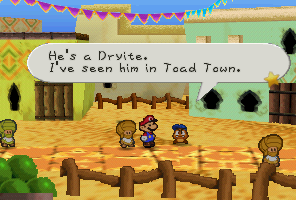Dryite: Difference between revisions
No edit summary |
No edit summary |
||
| Line 1: | Line 1: | ||
[[File:Dryite.png|frame|Goombario telling Mario about a Dryite]] | [[File:Dryite.png|frame|Goombario telling Mario about a Dryite]] | ||
{{multiframe | {{multiframe | ||
|[[File:PM Dryite | |[[File:PM Dryite Orange.png]] [[File:PM Dryite Blue.png]] [[File:PM Dryite Green.png]] [[File:PM Dryite Chartreuse.png]] | ||
|align=right | |align=right | ||
}} | }} | ||
'''Dryites''' are a race of [[Toad (species)|Toads]] that live alongside [[Little Mouser#Paper Mario|Nomadimice]] at the [[Dry Dry Outpost]] in the game ''[[Paper Mario]]''. One can also be found at a train station in [[Mt. Rugged]]. Dryites look the same as other Toads, except that they wear blue, green or | '''Dryites''' are a race of [[Toad (species)|Toads]] that live alongside [[Little Mouser#Paper Mario|Nomadimice]] at the [[Dry Dry Outpost]] in the game ''[[Paper Mario]]''. One can also be found at a train station in [[Mt. Rugged]]. Dryites look the same as other Toads, except that they wear orange (instead of red), blue, green, or chartreuse {{wp|tagelmust}}s and desert clothing instead of mushroom caps and vests. [[Mario]] can talk to the Dryites throughout his adventure to receive tips and hints. One of [[Kolorado]]'s assistants states that the people of Dry Dry Outpost are descendants of the [[Dry Dry Kingdom|makers]] of [[Dry Dry Ruins (Paper Mario)|Dry Dry Ruins]]. | ||
At the beginning of the game, a green Dryite is invited to the party at [[Peach's Castle]]. He says that he had a chance to speak with [[Princess Peach]] and plans to tell everyone about it when he returns to Dry Dry Outpost. In Chapter 8, long after [[Bowser]]'s takeover of the castle, the Dryite is seen in a cell in [[Bowser's Castle]] and calls the party ridiculous. At the end of the game, two green Dryites are invited to the new party celebrating Bowser's defeat, but it is unclear from their dialogue if either of them is the one imprisoned. | At the beginning of the game, a green Dryite is invited to the party at [[Peach's Castle]]. He says that he had a chance to speak with [[Princess Peach]] and plans to tell everyone about it when he returns to Dry Dry Outpost. In Chapter 8, long after [[Bowser]]'s takeover of the castle, the Dryite is seen in a cell in [[Bowser's Castle]] and calls the party ridiculous. At the end of the game, two green Dryites are invited to the new party celebrating Bowser's defeat, but it is unclear from their dialogue if either of them is the one imprisoned. | ||
Revision as of 05:46, January 31, 2023
Dryites are a race of Toads that live alongside Nomadimice at the Dry Dry Outpost in the game Paper Mario. One can also be found at a train station in Mt. Rugged. Dryites look the same as other Toads, except that they wear orange (instead of red), blue, green, or chartreuse tagelmusts and desert clothing instead of mushroom caps and vests. Mario can talk to the Dryites throughout his adventure to receive tips and hints. One of Kolorado's assistants states that the people of Dry Dry Outpost are descendants of the makers of Dry Dry Ruins.
At the beginning of the game, a green Dryite is invited to the party at Peach's Castle. He says that he had a chance to speak with Princess Peach and plans to tell everyone about it when he returns to Dry Dry Outpost. In Chapter 8, long after Bowser's takeover of the castle, the Dryite is seen in a cell in Bowser's Castle and calls the party ridiculous. At the end of the game, two green Dryites are invited to the new party celebrating Bowser's defeat, but it is unclear from their dialogue if either of them is the one imprisoned.
One of the Dryites participated at a Dojo in Toad Town, having fought his way to a Second-Degree Card.
Notable Dryites
Gallery
A Dryite imprisoned in Bowser's Castle along with three Toads
Names in other languages
| Language | Name | Meaning | Notes |
|---|---|---|---|
| Japanese | さばくの人[?] Sabaku no Hito |
Desert Person | |
| German | Dehydra[?] | A shortened form of "dehydration" | |
| Spanish | Sequi[?] | Probably comes from "sequito" (one of the diminutive forms of "seco", which means "dry") or "sequía" (drought) |

